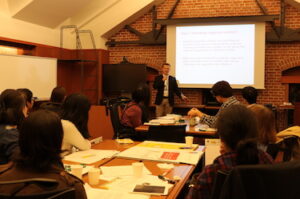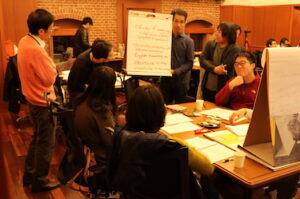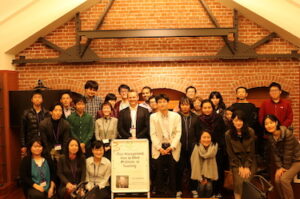2017年11月10日
【Event report】“Class Management: How to Solve Problems in Teaching”
<About>Thursday, November 2nd, 2017
Professional and Global Educators’ Community (PAGE) organized a workshop “Class Management: How to Solve Problems in Teaching.” In addition to research skills, faculty members are now required to have skills in education. Along with the increase of university enrollment rate and globalization, there is a growing demand for skills in delivering classes in English for students with various cultural backgrounds. In response to such demand, we invited Associate Professor Jan Sølberg from the University of Copenhagen, an expert in teacher development, as an instructor and organized a workshop to discuss how to manage classes in English based on the present situation of higher education in Europe.
It was held at the Ito International Research Center, Hongo Campus. A total of 26 participants consisted of graduate students, postdocs, and young researchers at the University of Tokyo. It was a three-hour-long workshop conducted in English, but we welcomed a lot of participants coming from diverse academic fields.

The instructor started the workshop by giving a lecture on the present situation regarding the globalization of higher education in Europe. A lot of participants seemed to be surprised at the fact that 35% of faculty members in science and 46% graduate students of master’s programs in science at the University of Copenhagen came from overseas. He then presented three cases that illustrated the problems faculty members were likely to encounter when teaching in English: how to conduct and evaluate examinations in English, how to organize group works in English, and how to deal with students’ needs who vary in cultural background and views in education. These are all serious issues that faculty members are required to solve. The participants listened attentively to the lecture.

Following the lecture was an activity with groups of four to five.
The participants engaged in a group work as shown below:
1. They listed up three important problems involved in EMI (English as a Medium of Instruction) and wrote them on large-sized Post-it Notes.
2. Each group’s Post-it Notes were handed on to the next one. The participants chose one of the three problems written on the Notes and discussed an effective solution to it in groups. They wrote the solution on a different Post-it Note and posted it on the wall together with the Note they chose.
3. The participants looked through the problems and solutions posted on the wall and exchanged ideas with other groups.
All the groups were actively engaged in the assignment and discussion.
Thanks to the diversity of their research fields, the participants seemed to be exchanging ideas from a wide variety of perspectives. Some of them actively moved around the venue to ask questions to other groups, and others discussed with the instructor.
The instructor gave a wrap-up lecture after the group work. He gave specific tips such as the points of preparing for classes conducted in English, how to communicate with lone-wolf students, and the points you should consider when presenting assignments to students.
The discussion never stopped throughout the three-hour-long workshop.
We received positive feedback from the participants as follows:
“It was a very fulfilling program, well-structured to enable active participation.”
“It was a good opportunity to discuss education with people from other fields.”
“It’s nice to have a lot of communication with people from different fields.”

PAGE will continue to hold workshops on the improvement of academic communication skills in English. We sincerely look forward to your participation.
Click here for a free online program provided by the PAGE project: English Academia.↓
https://utokyo-ea.com
Click here for more details of the PAGE project. ↓
https://www.he.u-tokyo.ac.jp/activities/page/





